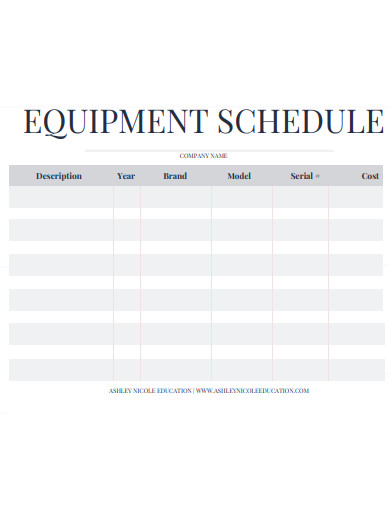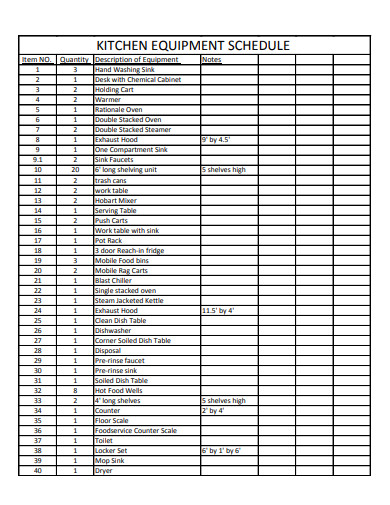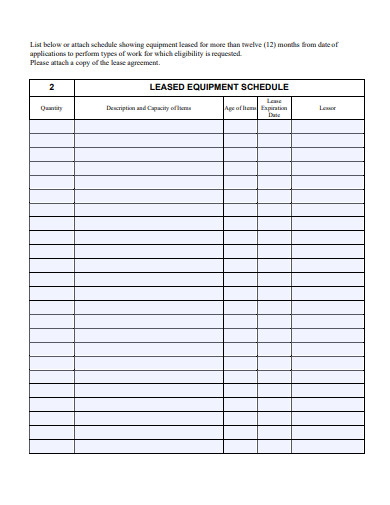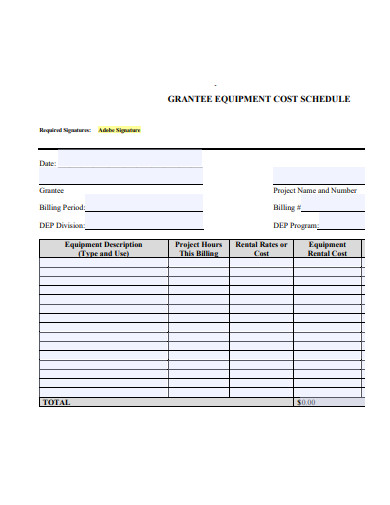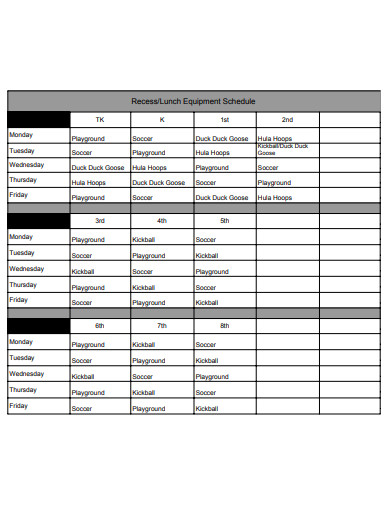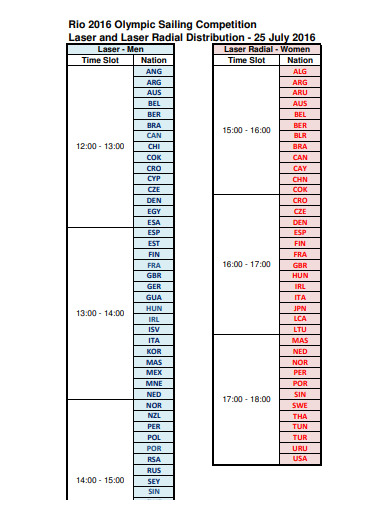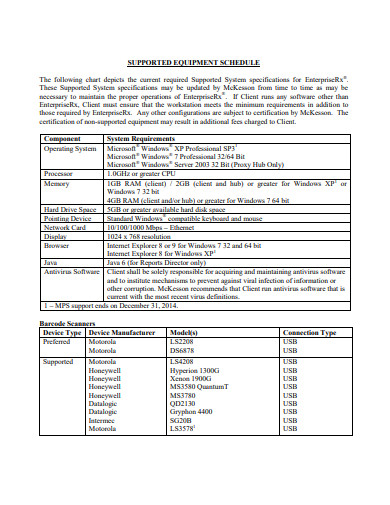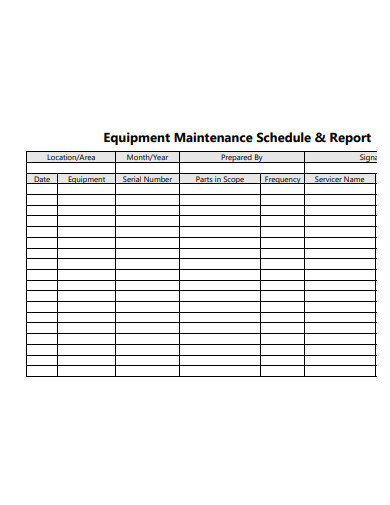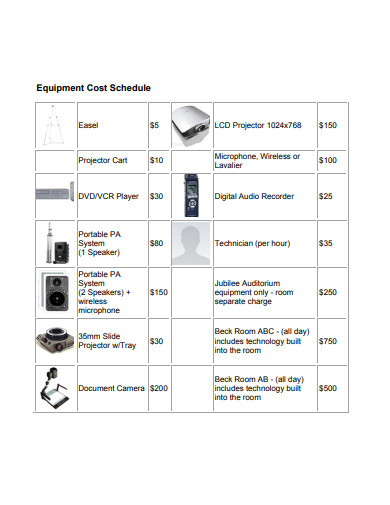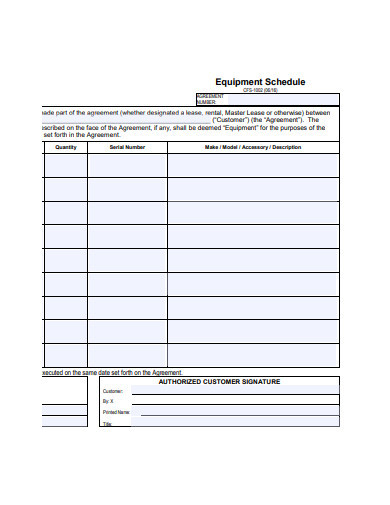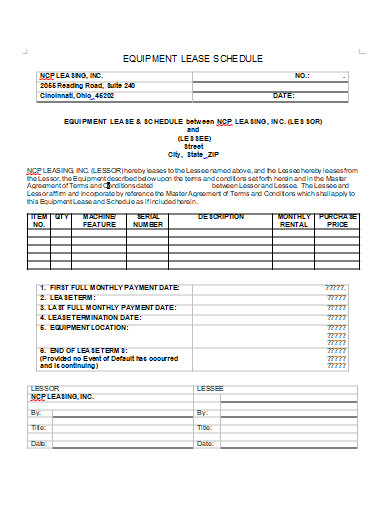You’ll need the correct equipment to get the job done if your company is to prosper. In order to maintain your production going well, you’ll also need a strategy for your equipment (covering its purchase, maintenance, calibration, and eventual replacement). A detailed equipment schedule is critical to an organization’s performance since it helps you to plan and track the efficiency of your equipment. In a nutshell, an equipment schedule allows you to break down your equipment-care projects into discrete activities and allocate them to specific team members or contractors. An equipment schedule also allows you to arrange (and track the status of) all phases of your equipment’s lifecycle, ensuring that you can use your equipment when it’s needed to complete a project successfully.
10+ Equipment Schedule Samples
Equipment scheduling aids in improved organization and planning, resulting in increased efficiency. You must plan and prepare for a job before beginning it. The phases of the project must be planned out, as well as the resources and assets required to achieve the aim. Equipment scheduling can help in this situation. Certain areas of your profession are impossible to complete without the proper instruments. You always know where the tools are, who is in control of them, and how frequently they will be used when you schedule equipment use.
1. Equipment Schedule
2. Sample Equipment Schedule
3. Leased Equipment Schedule
4. Grantee Equipment Cost Schedule
5. Lunch Equipment Schedule
6. Supplied Equipment Distribution Schedule
7. Supported Equipment Schedule
8. Equipment Maintenance Schedule & Report
9. Equipment Cost Schedule
10. Equipment Schedule Example
11. Printable Equipment Schedule
Conducting Equipment Scheduling
When you use equipment scheduling services, you remove the possibility of double booking or shortage, allowing you to plan projects with confidence, knowing that all of the tools you’ll need will be accessible.
Make a central database of your equipment
Before adopting equipment scheduling, create a database that lists all of your equipment and its present state. The first step is to develop a database and catalog all of your equipment, which will take time and effort but will be worthwhile. All staff will have access to a central database that will provide information on all assets, their status, and availability. As a result, staff will no longer need to ask you where a specific tool is or whether it is in use. The database ensures that you will always know where your tools are, reducing the danger of theft and misplacing them. The usage of a database also makes upkeep easier.
Create a project schedule
Creating a project schedule helps to keep track of your daily progress, guarantee that you have adequate resources to complete the project on time, and identify which stages, if any, are difficult. Scheduling allows you to keep track of your progress and whether or not you’re behind on your task. This makes it necessary in many businesses, even if maintaining a schedule can be difficult for individuals. If there are any delays, you must alert all stakeholders so that they may manage their expectations.
All team members should be able to quickly reference a single-source technique for scheduling and tracking individual piece of equipment maintenance or renewal. An equipment schedule template allows you to add facts about a piece of equipment, such as model and serial numbers, service quality, service engineer, and status, so that anybody can see the whole and next maintenance dates. Your projects may fall behind schedule if you don’t have the ability to arrange equipment maintenance, repair, and replacement, which can result to skipped objectives and timelines.
FAQs
What is considered to be the real backbone of any organization?
The equipment’s dependability is the true backbone of any firm. You must optimize your tools for timely, top-flight delivery to ensure the success of your projects. But how can you arrange and track the maintenance of your many pieces of equipment? How do you ensure that your consumers can count on you to deliver high-quality products and services on time?
How do you track changes in real time?
You can plan and restructure by tracking changes as they occur. In fact, you may have all of the assets you need to complete a project, but if you can’t account for them when you need them, they’re useless. As a result, many businesses use tracking systems that tell them where a tool is, who is using it, and when it will be available again. Another benefit of tracking is the ability to see changes as they occur, which improves transparency and productivity. When you detect a change, you can plan ahead of time to save time and avoid halts and delays, which is critical when you’re working on a tight deadline.
An equipment schedule ensures that your equipment is available and functional when you do need it. You’ll never let your colleagues or customers down if you can keep track of and record for all equipment maintenance, upgrade, calibration, and improvement. Whatever type of equipment you have, you’ll need a solid system for cataloging it, scheduling its maintenance or replacement, and monitoring its status. An equipment schedule template will guarantee that your equipment is in good working order to help you finish projects.
Related Posts
FREE 10+ Gym Schedule Samples in PDF | MS Word | Apple Pages | Google Docs | Keynote |
FREE 10+ Daily Hourly Schedule Samples in PDF
FREE 10+ Weekly Schedule Template with Hours Samples in PDF
FREE 10+ 7 Day Weekly Schedule Samples in PDF
FREE 10+ Working Schedule Template Samples in PDF
FREE 6+ Preschool Schedule Template Samples in PDF
FREE 10+ Daily School Schedule Samples in PDF | MS Word | Google Docs | Google Sheets | Excel
FREE 10+ Day Schedule Samples in PDF
FREE 10+ Daily Work Schedule Samples in PDF
FREE 10+ 24 Hours Schedule Samples in PDF | Word | Google Docs | Google Sheets | Excel | Apple Numbers | Apple Pages
FREE 10+ Baseball Schedule Samples in PDF
FREE 10+ Availability Schedule Samples in PDF
FREE 10+ Weekly Cleaning Schedule Samples in PDF
FREE 8+ Employee Scheduler Template Samples in PDF
FREE 10+ Weekly Work Schedule Samples in PDF

